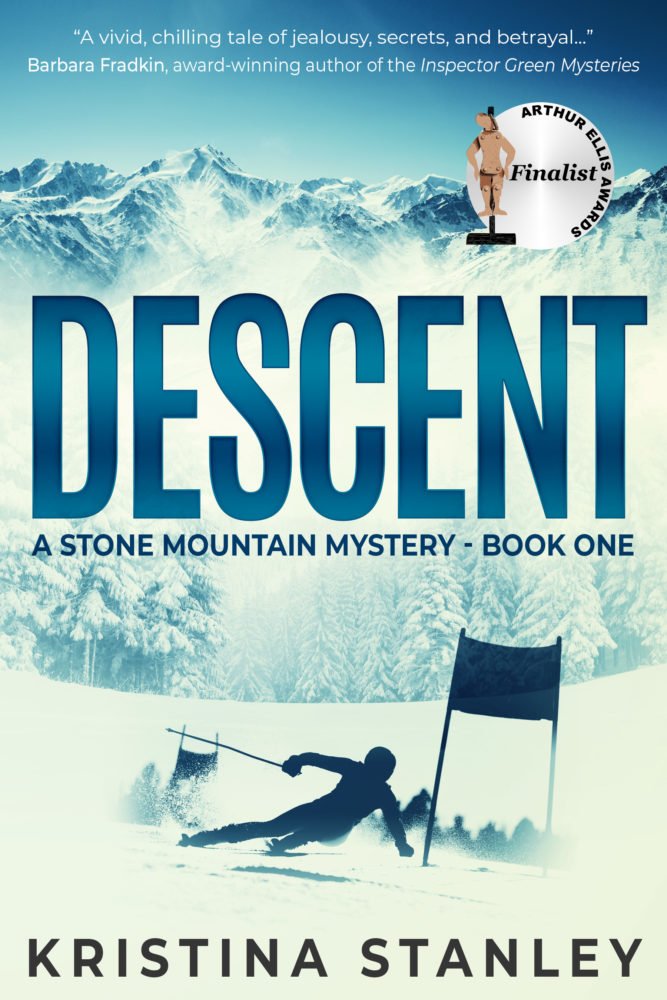What Is a Book Endorsement?
A book endorsement is a short comment praising your book from someone who has read your book. The best and most convincing book endorsements tend to come from other well-known writers with the same target audience as your book.
How to Write an Endorsement
There are three simple steps for writing a convincing and accurate book endorsement.
- Read the book and take notes about elements you particularly liked or admired
- Turn your notes into a paragraph or two
- Whittle that paragraph down to a single sentence that gets to the heart of your thoughts and emotions about the book.
Book Endorsement Examples

The endorsements on the outside cover are edited to contain only the most enticing words. The full endorsement is written on the inside of the book after the copyright page.
For my novel DESCENT, the front jacket endorsement is:
“A vivid, chilling tale of jealousy, secrets, and betrayal…”
– Barbara Fradkin, award-winning author of the Inspector Green Series.
The full endorsement printed inside the book is:
In this impressive debut, Kristina Stanley weaves a vivid, chilling tale of jealousy, secrets, and betrayal in a close-knit mountain ski village. Like its likeable young heroine, Kalin Thompson, DESCENT is both tender and tough. — Barbara Fradkin, award-winning author of the Inspector Green Series.
Readers have two chances to discover the endorsements, and that’s two chances that they will buy your book.
How to Get an Endorsement
I have a confession to make: when a novel of mine is close to being published, I get nervous.
I get nervous because I know that it’s almost time to start sending out Advance Reader Copies (ARCs) — an almost-but-not-quite-final version of my book — for endorsements. ARCs are sent before the final editing and proofreading is complete. Why do I stress myself out this way?
Despite my misgivings, there’s a method to the madness. When your book hits the shelves, endorsements on the front and back cover adds legitimacy. It’s added promotional material every time someone picks up your novel. It’s important to get endorsements early, so they can be incorporated into your book’s cover design and online listings.
The endorsements that go on your cover are ones that connect with your readers. You want to find authors who write in your genre that readers will recognize. Having an endorsement from your mom is nice, but it won’t help sell your book. (Unless your mom is a famous author. In this case, go ahead and use her!)
Online readers can browse a free sample of your book and the endorsements will be there to read. You can also put the endorsement underneath your book blurb on the channels where you sell eBooks.
Endorsements are critically important, and it all starts with the ARC. It makes me nervous to have people I know and admire read an unfinished version of my book, but the payoff is so worth it.
Here are my tips on how you can spin your ARCs into book marketing gold:
Networking and the ARC
I learned early in my writing career that networking long before I finished my first novel is critical to the publishing journey.
How does one find established authors willing to spend their time reading an about-to-be-published-for-the-first-time author’s novel? That’s where networking comes in.
I’ve attended writing conferences, workshops and awards dinners. Each of these gave me a way to meet other authors. I started a blog. Got active on Twitter, Facebook, LinkedIn etc.
When I first joined the Crime Writers of Canada(CWC), I sent every CWC author a LinkedIn message asking them to connect with me. Hundreds did. I was amazed. I kept a spreadsheet of the authors I’d sent a message to, which ones accepted my invitation and included a check mark when I sent a thank you. Since then, I’ve kept up communication with authors, sending them a message when I’d read their book and posted a review.
Who To Ask For An Endorsement
I chose authors that I had some connection with. Either I’d met them in person, or I’d connected with them on the Internet. I looked for authors where our writing had something in common.
I wrote a letter to each author as I would a query letter. I included my writing credentials and the reason I was asking a specific author. Part of asking is the condition that if they didn’t like the book, I wouldn’t expect an endorsement.
What Format to Send
When possible, ask the author which format they prefer (i.e. PDF, mobi, epub, print, etc.). This shows them respect andit means they won’t be distracted from the story because they’re reading in a format they don’t like.
For one author, I was so thrilled they said they would read an ARC, I had it printed and bound at my local print store.
How Many Endorsements Are Enough?
I recommend a minimum of three. One for the front cover of your novel and two for the back. My covers have the highest profile endorsement on the top of the front cover. The next two endorsements are on the top and bottom of the back cover. When potential readers pick up my novel, they don’t even have to open the cover to see the promotional material.
For anything more than three endorsements, jump up and down and do the happy dance. Then plan to put the endorsements after the copyright page.
A Thank-You
We all know a thank you goes a long way. After my book is published, I mail a signed print edition of my novel to any author who endorsed it. I know I love to receive a copy of any book I’ve endorsed, so I’m assuming others like this too.
On that note, thanks for reading!
How to Get the Best Book Endorsement
To get a brilliant book endorsement, it is important to perform a story edit before sharing your story.
Fictionary StoryTeller is online software that simplifies story editing. Fictionary StoryTeller helps you evaluate your story on a scene-by-scene basis. You’ll be able to focus on problem areas in your manuscript and improve it quickly.
Why not check out Fictionary’s StoryTeller free 7-day trial and tell powerful stories?
![]()


